October15
August was a bonanza-beach-bonus month for me. I gave myself time to devour a total of 15 books, of which nine were mysteries, my comfort food of reading. In case you’re not as enthralled with that genre as I am, I divided my list into two parts.
This post brings me almost up to date with my reading record!
NON-MYSTERIES
Firmin by Sam Savage (Fiction)
by Sam Savage (Fiction)
Firmin is a rat born in the basement of a Scolley Square bookstore in Boston in the early 1960s. His mother is 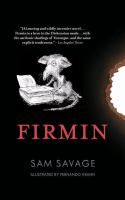 an alcoholic and eventually deserts the family. Driven by hunger, Firmin makes a diet of Zane Grey, Lady Chatterley’s Lover, and Jane Eyre. Strangely, as Firmin eats, he takes in the words (and meanings), becoming an extremely literate rat.
an alcoholic and eventually deserts the family. Driven by hunger, Firmin makes a diet of Zane Grey, Lady Chatterley’s Lover, and Jane Eyre. Strangely, as Firmin eats, he takes in the words (and meanings), becoming an extremely literate rat.
Told from Firmin’s point of view, the book is by turns hilarious, tragic and hopeful. I really liked the story and loved the cover, with its bite-size medallion taken out of the side. Best cover of my year, I’m sure, and a great example of the need for print books.
Read this if: you love the classics, or books in general. Basically, if you’re reading this post, you should read Firmin. 4½ stars
Practical Jean by Trevor Cole (Fiction, Canadian)
by Trevor Cole (Fiction, Canadian) 
Jean Horemarsh has just returned to living with her husband after three months spent caring for her mother as she died of cancer. After watching her mother die, Jean is convinced no one should have to suffer the indignities of aging and illness like her mother did—and she, Jean Horemarsh, will take it upon herself to give each of her friends one final, perfect moment . . . and then, one by one, kill them.
The 2011 winner of the Stephen Leacock Memorial Medal for Humour, Practical Jean is wickedly funny and thought-provoking.
Read this if: you appreciate irony, or a darker shade of humour.
4½ stars
Heading Home: On Starting a New Life in a Country Place by Lawrence Scanlan (Non-fiction, Memoir, Country Living, Canadian)
by Lawrence Scanlan (Non-fiction, Memoir, Country Living, Canadian) 
You may know that my husband and I exchanged big city living for life in rural Nova Scotia nine years ago, so I’m always interested in books/memoirs about moving to the country. Scanlan, who moved from the city of Kingston to the village of Camden East, Ontario (pop. 250) has written one of the best I’ve encountered.
The book’s twelve chapters, each devoted to one month, chronicle a year in the life of the village. Heading Home is a beautiful piece of narrative non-fiction, yet it is packed with extremely practical advice for anyone yearning to start over in a country place.
Read this if: you are contemplating country life – or if you just wonder what it’s like. 4½ stars
A Recipe for Bees by Gail Anderson-Dergatz (Fiction, Canadian)
by Gail Anderson-Dergatz (Fiction, Canadian) 
When Gail Anderson-Dargatz showed the manuscript of A Recipe for Bees to her divorced parents, it caused them to reconsider their sixteen-year separation. “My parents, Eric and Irene, are models for Karl and Augusta in many ways. I set out to show them how extraordinary their seemingly ordinary lives were.” She interviewed them during the writing of the book and as they read the work in progress, they began to talk about unresolved problems(…) Her parents were remarried on Christmas Day, 1998, some fifty years after their first marriage.
This is a lovely anecdote but it doesn’t really surprise me. A Recipe for Bees is a masterful examination of relationships, primarily the one between Augusta and her husband. At its heart are the life, death, and resurrection of an extraordinary marriage. With lots of beekeeping lore, this Giller Prize nominated (1998) story is as sweet as honey.
Read this if: you believe that the bonds of marriage should hold, for better or for worse. 4 stars
The Absolutist by John Boyne (Fiction, WWI)
by John Boyne (Fiction, WWI) 
“It is September 1919: twenty-one-year-old Tristan Sadler takes a train from London to Norwich to deliver a 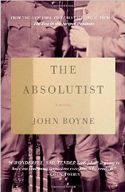 package of letters to the sister of Will Bancroft, the man he fought alongside during the Great War. But the letters are not the real reason for Tristan’s visit. He can no longer keep a secret and has finally found the courage to unburden himself of it.”
package of letters to the sister of Will Bancroft, the man he fought alongside during the Great War. But the letters are not the real reason for Tristan’s visit. He can no longer keep a secret and has finally found the courage to unburden himself of it.”
Most reviewers love this book. I’m more ‘meh’. The writing is superb and the story unfolds with just the right amount of tension from beginning to end. But I wasn’t blown away by the climax. I understand Will’s stand and determination to stick to it despite the consequences, and Tristan’s actions didn’t make any difference to the outcome. Maybe I’ve just read too many WWI novels recently.
Read this if: you enjoy WWI stories; you’re interested the relationships between soldiers during wartime; or if you approve of war in principle. 3½ stars
The Doll’s House by Rumer Godden (Children’s Chapter book)
by Rumer Godden (Children’s Chapter book) 
The activities, sorrows, and joys of a family of dolls living in an old doll house are related from the dolls’ point of view.
It’s rather dated, but charming. Read this if: you ever played with a dollhouse – or wanted to (and who didn’t?) 3 stars
* * * * *

* * * * *
MYSTERIES
The Dog Who Knew Too Much by Spencer Quinn
by Spencer Quinn 
“Combining suspense and intrigue with a wonderfully humorous take on the link between man and beast, Spencer Quinn’s exceptional mystery series has captured widespread praise since its New York Times bestselling debut, Dog on It”. In the fourth entry in the series, The Dog Who Knew Too Much, canine Chet becomes the focus of dognappers, while his partner Bernie is looking for a boy who has gone missing from a wilderness camp in the high country. The Dog Who Knew Too Much is classic Spencer Quinn, offering page-turning entertainment that’s not just for dog-lovers.
I love this series featuring Bernie Little and his dog Chet who narrates the books. The mysteries are always suspenseful and solidly developed. But it’s Chet who makes this series. His love of life is exhilarating for me.
Read this if: you love dogs and mysteries – or if you just love dogs – or if you just like mysteries. (I really can’t be objective about Chet.) 4½ stars
Elegy for Eddie by Jacqueline Winspear
by Jacqueline Winspear 
The Maisie Dobbs series has been described by USA Today as ‘less whodunits than why-dunits, more P.D. James 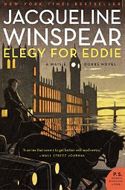 than Agatha Christie’ (USA Today) I’ve followed this series since Maisie debuted as a newly discharged WWI nurse in 1919, through Maisie’s growth during the 1920s. I particularly appreciate that Maisie’s life – her circumstances, her friendships, her personality with both strengths and flaws—has not remained static but has developed naturally as it might have in her time and place.
than Agatha Christie’ (USA Today) I’ve followed this series since Maisie debuted as a newly discharged WWI nurse in 1919, through Maisie’s growth during the 1920s. I particularly appreciate that Maisie’s life – her circumstances, her friendships, her personality with both strengths and flaws—has not remained static but has developed naturally as it might have in her time and place.
Set in 1933 London Elegy for Eddie, the ninth and latest Maisie Dobbs offering, has Maisie investigating the brutal killing of a street peddler from the working-class neighborhood of her childhood. It’s one of the best in a super series.
Read this: after you’ve read the rest of the series. Yes, each book in the series stands alone, but they’ll have greater impact if you’ve watched Maisie grow. If the period in Britain between the World Wars intrigues you, or you enjoy a strong but flawed female protagonist, you’ll particularly enjoy this series. 4 stars
.
A Lesson in Secrets by Jacqueline Winspear
by Jacqueline Winspear 
In the eighth book in the Maisie Dobbs series, A Lesson in Secrets, Maisie is working for the Secret Service at a pacifist college in Cambridge. The Secret Service is particularly suspicious of what they see as the country’s biggest threat: communism, while basically ignoring the rise of fascism and Nazism.
This is a solid entry in this series, and one with a slightly different perspective for Maisie. 4 stars
Dead Man’s Folly by Agatha Christie
by Agatha Christie 
The ‘folly’ of the title is actually an architectural term defined as “an eccentric, generally non-functional structure erected to enhance a romantic landscape.” Of course, the play on words using the more commonly understood meaning of the word is intentional. In this classic Christie, Adriadne Oliver arranges a mock Murder Hunt for charity and calls in her friend Hercule Poirot when a real body is discovered. Although this was published in 1956, it has the feel of one of Christie’s slightly older stories: the classic country estate, the Lord & Lady, the house guests, and so on.
In addition to the word play of the title, there is the gentle mockery of Christie herself, on whom Ariadne Oliver is said to be based. So she sets up a murder and doesn’t know who the murderer is. Very well-done, excellently clued but still perplexing mystery.
Read this if: you’re looking for a classic English country whodunit set in the mid-twentieth century. 4 stars
The Tragedy of Z by Ellery Queen (Barnaby Ross)
by Ellery Queen (Barnaby Ross) 
This is the third in the Drury Lane series (the Tragedies of X,Y &Z). Drury Lane is a blind, retired stage actor and a good friend of (the fictional) Ellery Queen. This was published in 1933, is melodramatic but oh-so-elegant. The mystery is fairly clued, but very difficult. I don’t think I’ve ever solved a novel-length Ellery Queen. 3½ stars
At Bertram’s Hotel by Agatha Christie
by Agatha Christie 
Miss Jane Marple takes a two week holiday at Bertram’s Hotel, of which she has fond childhood memories. So! 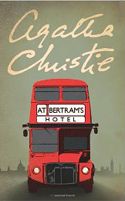 It’s 1965 and Bertram’s hasn’t changed since King Edward V’s time. And that, dear reader, is part of the mystery. Although the hotel seems charming at first, it takes on a sinister face. There’s a great cast of vintage Christie characters, but Jane Marple plays only a peripheral part in the whole investigation.
It’s 1965 and Bertram’s hasn’t changed since King Edward V’s time. And that, dear reader, is part of the mystery. Although the hotel seems charming at first, it takes on a sinister face. There’s a great cast of vintage Christie characters, but Jane Marple plays only a peripheral part in the whole investigation.
Read this if: you’d like to see Christie acknowledge the modern world encroaching on her country-house-cozy formula that was successful and more or less unchanged for decades. 3 stars
QBI by Ellery Queen
by Ellery Queen 
A 1955 collection of EQ’s short stories, titled Queen’s Bureau of Investigation. The only one I came close to solving was the first one and it was over before I realized I wasn’t reading a full-length novel. Very enjoyable quick read – and it fulfilled two of my reading challenges – the ‘Q’ title in A-Z Reading Challenge and the ‘1955’ in Read the First Years of your Life Challenge.
Read this if: you enjoy short mysteries such as those found in Ellery Queen or Alfred Hitchcock magazine; or want short, intelligent challenges. 3 stars
Mystery of the Cape Cod Tavern by Phoebe Atwood Taylor
by Phoebe Atwood Taylor 
This book, published in 1934 is only the second P.A. Taylor I’ve read (the other was the debut in the series). We meet a different middle-aged spinster narrator who stumbles into a murder and happens to have handyman Asey Mayo at hand. This is a closed room mystery in that the culprit has to be one of the Tavern’s (aka Inn) guests. Or does it? There are a lot of comings and goings and secret passages for a house under police observation. It’s that that weakens the enjoyability of this mystery. I can suspend my disbelief only so far.
Read this if: you’re a fan of this series, or of tart New England ways. 2½ stars
Postern of Fate by Agatha Christie
by Agatha Christie 
In the 1973 Postern of Fate, we find Tommy & Tuppence Beresford retired and having just bought a new-to-them old house. There is an old mystery (from WWII) connected with the house, but the point of the book (if there is one) seems to be to catalogue all the books that Christie read and loved as a child. The writing, quite uncharacteristic of Christie, sounds as if the author was a doddering old woman (well, she was 83) who was dictating a vague idea of a story. (But, where were her editors?!) The book meanders, repeats, meanders some more. It was maddening, and I finished it only because it fulfilled two of my more difficult reading challenges – Birth Year Reading Challenge, and Vintage Mysteries – Lethal Locations. (Who knew that the “Postern of Fate’ was a gate into Damascus?)
Read this if: you are a complete Christie freak and want to know all about her childhood reading, or must read all of her work. Otherwise – don’t read this. 1 star for the Christie connection



Links for my CANADIAN readers:
Firmin
Practical Jean
Heading Home
A Recipe for Bees
The Absolutist
The Dolls’ House
The Dog Who Knew Too Much
Elegy For Eddie
A Lesson in Secrets
Dead Man’s Folly
The Tragedy of Z
At Bertram’s Hotel
QBI 
Mystery Of The Cape Cod Tavern
Postern Of Fate
KINDLE editions:
Firmin
Practical Jean 
A Recipe for Bees
The Absolutist
The Dolls’ House
The Dog Who Knew Too Much 
Elegy for Eddie:
A Lesson in Secrets
Dead Man’s Folly
At Bertram’s Hotel 
Postern of Fate
AUDIOBOOKS:
The Absolutist
At Bertram’s Hotel: A BBC Full-Cast Radio Drama
 The $50,000 ScotiaBank Giller Prize for Fiction was awarded tonight to Will Ferguson for his novel 419. The Scotiabank Giller Prize is Canada’s most distinguished literary prize, awarded annually to the author of the best Canadian novel or short story collection published in English.
The $50,000 ScotiaBank Giller Prize for Fiction was awarded tonight to Will Ferguson for his novel 419. The Scotiabank Giller Prize is Canada’s most distinguished literary prize, awarded annually to the author of the best Canadian novel or short story collection published in English. 

 an alcoholic and eventually deserts the family. Driven by hunger, Firmin makes a diet of Zane Grey, Lady Chatterley’s Lover, and Jane Eyre. Strangely, as Firmin eats, he takes in the words (and meanings), becoming an extremely literate rat.
an alcoholic and eventually deserts the family. Driven by hunger, Firmin makes a diet of Zane Grey, Lady Chatterley’s Lover, and Jane Eyre. Strangely, as Firmin eats, he takes in the words (and meanings), becoming an extremely literate rat. package of letters to the sister of Will Bancroft, the man he fought alongside during the Great War. But the letters are not the real reason for Tristan’s visit. He can no longer keep a secret and has finally found the courage to unburden himself of it.”
package of letters to the sister of Will Bancroft, the man he fought alongside during the Great War. But the letters are not the real reason for Tristan’s visit. He can no longer keep a secret and has finally found the courage to unburden himself of it.”

 than Agatha Christie’ (USA Today) I’ve followed this series since Maisie debuted as a newly discharged WWI nurse in 1919, through Maisie’s growth during the 1920s. I particularly appreciate that Maisie’s life – her circumstances, her friendships, her personality with both strengths and flaws—has not remained static but has developed naturally as it might have in her time and place.
than Agatha Christie’ (USA Today) I’ve followed this series since Maisie debuted as a newly discharged WWI nurse in 1919, through Maisie’s growth during the 1920s. I particularly appreciate that Maisie’s life – her circumstances, her friendships, her personality with both strengths and flaws—has not remained static but has developed naturally as it might have in her time and place. It’s 1965 and Bertram’s hasn’t changed since King Edward V’s time. And that, dear reader, is part of the mystery. Although the hotel seems charming at first, it takes on a sinister face. There’s a great cast of vintage Christie characters, but Jane Marple plays only a peripheral part in the whole investigation.
It’s 1965 and Bertram’s hasn’t changed since King Edward V’s time. And that, dear reader, is part of the mystery. Although the hotel seems charming at first, it takes on a sinister face. There’s a great cast of vintage Christie characters, but Jane Marple plays only a peripheral part in the whole investigation. Yes – I’m still behind, but I’m running to catch up before I take some time off later this month. (What have I been doing until now, you ask, if not taking time off? Well, I’ve been busy with non-bookish things – and reading, of course.)
Yes – I’m still behind, but I’m running to catch up before I take some time off later this month. (What have I been doing until now, you ask, if not taking time off? Well, I’ve been busy with non-bookish things – and reading, of course.)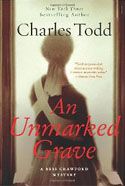 by Charles Todd
by Charles Todd  If you’ve been around the Internet any length of time, no doubt you’ve received one of those Nigerian “I’ve millions in government money that needs to be smuggled out” or “please help this young girl escape her enemies” emails. These scams are called 419s. “The name comes from the section in the Nigerian Criminal Code that deals with obtaining money or goods under false pretenses.” Hence, the title of Canadian writer Will Ferguson’s
If you’ve been around the Internet any length of time, no doubt you’ve received one of those Nigerian “I’ve millions in government money that needs to be smuggled out” or “please help this young girl escape her enemies” emails. These scams are called 419s. “The name comes from the section in the Nigerian Criminal Code that deals with obtaining money or goods under false pretenses.” Hence, the title of Canadian writer Will Ferguson’s  Sub-titled How Our Obsession with Stuff is Trashing Our Planet, Our Communities, and Our Health — and a Vision for Change
Sub-titled How Our Obsession with Stuff is Trashing Our Planet, Our Communities, and Our Health — and a Vision for Change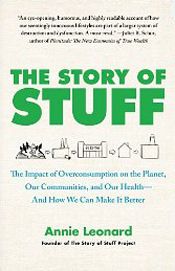 An expansion of the
An expansion of the  that we convert the buying and use of goods into rituals, that we seek our spiritual satisfaction, our ego satisfaction, in consumption…we need things consumed, burned up, replaced and discarded at an ever-accelerating rate.”
that we convert the buying and use of goods into rituals, that we seek our spiritual satisfaction, our ego satisfaction, in consumption…we need things consumed, burned up, replaced and discarded at an ever-accelerating rate.”  Out it goes—when we don’t know how to repair it, when we want to make room for new Stuff, or because we’re sick of the old Stuff. Sometimes we throw something out thinking it will be easier to replace later than to store it until we need it again. Sometimes we even consider throwing things away a cathartic activity and congratulate ourselves on a productive day of getting Stuff out of the house.”
Out it goes—when we don’t know how to repair it, when we want to make room for new Stuff, or because we’re sick of the old Stuff. Sometimes we throw something out thinking it will be easier to replace later than to store it until we need it again. Sometimes we even consider throwing things away a cathartic activity and congratulate ourselves on a productive day of getting Stuff out of the house.”